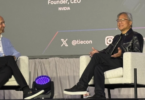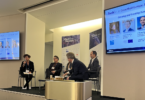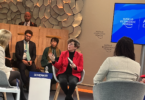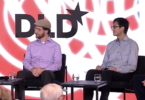« What Kind of Internet Do We Want To Build ? » This question — the title of a speech given by Facebook COO Sheryl Sandberg at DLD19 — was an underlying theme of this annual gathering of the technorati from the U.S., Europe, China and Africa.
An Internet that ensures data privacy: Trust remains a big issue. Sandberg, who announced that Facebook is endowing a new institute devoted to the ethics of artificial intelligence at the Technical University of Munich, is trying to mend fences and convince the world that the social media giant is a good actor that has made mistakes but is trying to do better. Sandberg largely failed to convince the audience that an American company that answers only to itself and its shareholders can be trusted with the protection of people’s data.
Several on-stage discussions that followed focused on how Europe, which is lagging behind on digital innovation, could use the backlash against American companies’ misuse of data and China’s use of Internet technology to control its population. Europe has a chance to lead by offering a third way — one that safeguards European values such as data privacy and democracy by encapsulating them into the technologies that will underpin the future. Claudia Nemat, a member of Deutsche Telekom’s board of directors, called on European startups to use blockchain and other technologies to build offerings that enforce data privacy.
An Internet that is inclusive : How technology can be used to help Africa leapfrog ahead was another focus. Fatoumata Ba, founder and CEO of Janngo, a tech for good platform, which is empowering women and helping to strengthen small and medium-sized businesses across the African Continent, was the winner of this year’s Aenne Burda award for Creative Leadership.
Prior to launching Jaango, Ba worked at e-commerce marketplace Jumia, the first African unicorn, serving as Ivory Coast CEO, a managing director in Nigeria and a member of the executive committee at Africa level, helping to driving the performance of 130+ operations across Africa, spanning around 10+ verticals in 30+ countries with 3000+ direct jobs, 70000+ indirect jobs and creating opportunities created for more than 500,000 SMEs across Africa.
While at Jumia Ba launched a program to equip Nigerian housewives with tablets to help the e-commerce site sell products. These women are earning as much as twice the average local salary , says Ba, and many have told her that they have « earned back their dignity in their own household » by being able to signficiantly contribute to their family’s income.
Her new venture Jaango builds digital ecosystems in high growth sectors by providing business support to small and medium enterprises (SMEs) to scale and contribute to the economic empowerment of youth and women through job creation and capacity building. Through this approach Jaango, which means future, hopes to create inclusive economic models for tomorrow, generating profits and a positive social impact. To reach its goal Janngo recently raised a million euros from the Mulliez family, owner of the Auchan supermarket chain, the investment bank Clipperton and Soeximex, a leading importer-exporter in West Africa.
One of Janngo’s first priorities is to help solve logistics issues for SMEs The extremely high cost of moving goods in Africa — which represents up to 75% of merchandise costs versus 6%–7% on average worldwide -is a huge challenge. Farmers and local producers are often forced to sell off their crop at ridiculously low prices or let them rot in the fields. As a first step Janngo has launched Jexport, a turnkey import-export digital platform, to help SMEs in the Ivory Coast accelerate their integration into regional and global value chains.
Technology that is people-centric : The future of work was also on the agenda. Chinese AI expert and author Kai-Fu Lee, the former head of Google China, said he believes that work will remain the most important part of people’s sense of self-worth for at least 50 years and said this should be taken into account when developing artificial intelligence. He said he thinks universal basic income is a terrible idea because it destroys people’s self-worth and in his view might lead to depression and addiction; Sandberg mentioned Facebook’s work with Freeformers, a company that helps reskill workers , in her keynote, as a way of underlining that Facebook cares about the future of the people on its platform.






